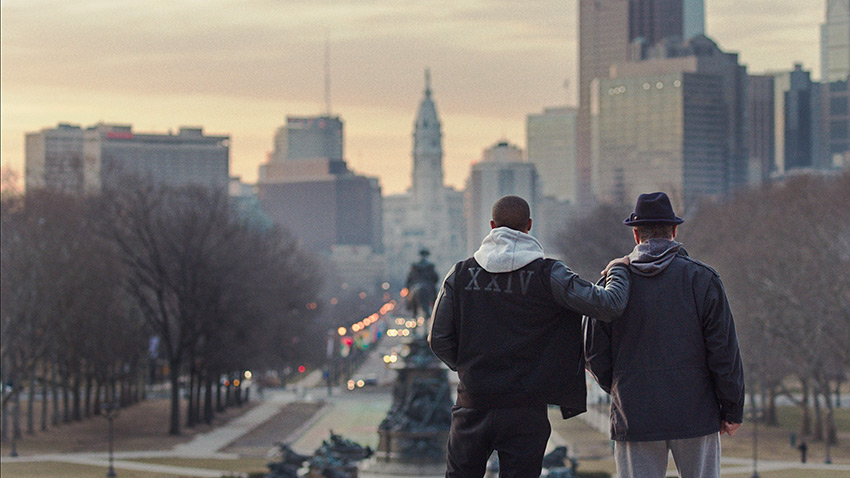For the month of January, the contenders of Deadshirt are looking at the high highs (and low lows) of Sylvester Stallone’s Rocky franchise. For each installment, Deadshirt film editor Max Robinson sits ringside with another Deadshirt staffer to discuss the film. For our final installment, Max and David Uzumeri talk about the game-changing Creed.
Creed (2015)
Directed by Ryan Coogler
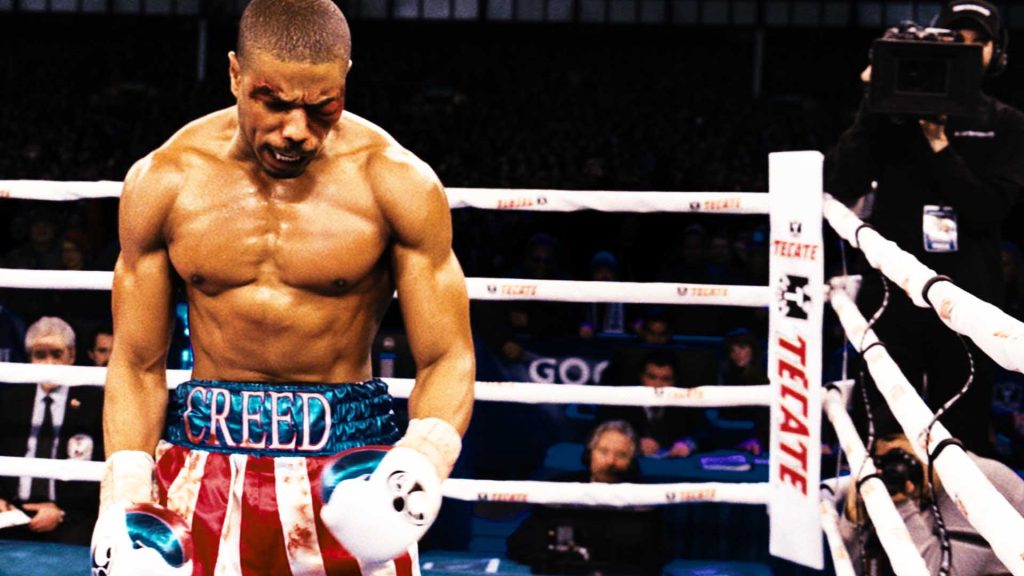
Max: Straight up: Creed is incredible. This is so much more than just a good Rocky movie. It stands on its own as just a really excellent film. On one level, it’s about Apollo Creed’s illegitimate son (an outstanding Michael B. Jordan) trying to live up to an impossible legacy. But it’s also pretty obviously about addressing the bum deal Apollo himself gets in the Rocky universe and fitting the underdog Rocky story to a new, black protagonist. It’s this amazing middle ground between the grounded drama of the original Rocky and the far-out superhero story the later Rockys wanted to be, complete with on-screen trading card stats for each boxer. Coogler made a Rocky sequel that is not only good; I’d argue Creed is as good as the original Rocky.
David: This is my second Rocky movie, the first being Rocky itself which I saw for the first time just last year. As a result, I can’t speak to Stallone’s actual directorial style, but Ryan Coogler drives circles around John G. Avildsen. I was expecting a well-made drama with great performances like Coogler’s previous Fruitvale Station, but this was just on another level. It’s an unapologetic formula piece, but there’s a huge satisfaction in seeing someone do a familiar tune really, really well, with lots of room left for technical virtuosity (the one-shot fight sequence, woo-fuckin’-ee) and inventiveness improvising on this familiar skeleton. I loved it.

Max: Let’s talk about this opening scene, because, holy shit, this movie does not fuck around from MINUTE ONE. Not only is it pretty ballsy to open, of all things, a Rocky movie with images of black kids ordered up against a wall in a youth facility, but that first scene between young Adonis and Mary Anne Creed is just profoundly powerful stuff. Phylicia Rashad doesn’t have a ton of screentime in Creed, but she really does so much with it. Rashad didn’t play Apollo’s wife in the earlier films, but her Mary Anne feels like a person with a real history behind her: The way she bristles at being confused for a social worker, how clearly painful this experience is for her.
David: There’s some great camerawork, especially the constant shifts to Adonis’s hands tensing, the visible fight he’s putting up not to immediately lash out. This movie’s excellent, but it’s far from subtle — intentionally so — and Coogler uses this opening sequence to pretty much spell out Adonis’s internal conflict for the remainder of the film. You see it coming, he knows you see it coming, but it works so well because — like everything here — the execution is just so strong.
I’ve never seen Alex Henderson, who plays Young Adonis, in anything before, but he puts in a pretty damn good performance for his limited screen time, too.
Max: This opening is really well done, and it gets me because Coogler immediately grounds Creed in this idea of unselfish, unfettered love. That Mrs. Creed would seek out Apollo’s son from an extramarital affair and save him, it’s really touching. Creed has this complex, extremely real humanity to it.
David: One thing I really noticed in this movie is that every major relationship is sort of beautifully reciprocal. Adonis’s relationships with both Bianca and Rocky aren’t one-sided; there’s scenes put into the script to underline this with fairly explicit discussions of the intimate politics of transactions in relationships. Adonis agrees to fight if Rocky will fight, and Adonis and Bianca are both two young, gifted artists that can only practice their chosen crafts for a short time, a small percentage of their overall lives. Creed is the rare movie where everyone’s truly relatable without undercutting the realness of the conflict. Much like Rocky and Creed in the first Rocky, it takes care not to create any villains.
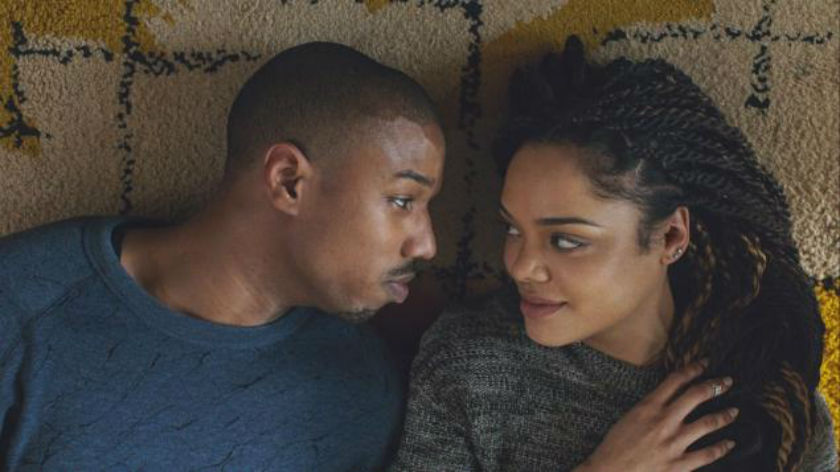
Max: Tessa Thompson’s Bianca really does a lot to solve The Adrian Problem. Bianca is a compelling character in her own right with a great hook — that she’s a singer who will eventually lose her hearing — and the movie does a nice job of having her romance with Adonis feel natural.
So yeah, let’s talk about Stallone in this film, yeah? This is Stallone’s best performance as Rocky Balboa and absolutely a career best for him.
David: The movie even homages the apartment door scene, turning it into being about respecting boundaries and letting go, which is both clever and commendable. Stallone’s a powerhouse here; it certainly can’t hurt that much of this movie is emotionally in tune with his role as the character and world’s creator — as much as Rocky’s inspired by this kid and excited to be a supporting role in his story, you can tell Stallone’s inspired by Coogler’s handling of his material. There’s a meta level of the movie that works really well to enhance and fuel some of the movie’s more emotional moments, especially everything involving Rocky’s battle with cancer, which is such an incredibly proud and vulnerable performance.
Max: “Rocky gets cancer” would have been a very melodramatic plot point in a lesser movie (like, say, Rocky V) but Stallone and the script play this with perfect subtlety. When Rocky hears he has lymphatic cancer, his response is muted, as if he knew this was coming and is resigned to it. Cancer is the biggest, scariest fight of Rocky’s life, and he doesn’t have the heart to face it because it’s the same thing that cost him his wife. There is so much going on when Donnie finds out about Rocky’s cancer and the mixture of shame, anger and sadness that Stallone is able to articulate on screen is so disarming.
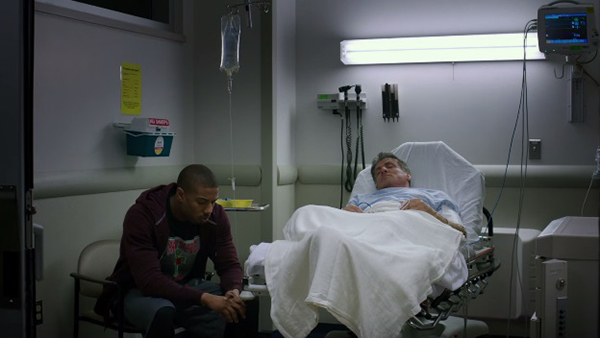
David: Adrian watched Rocky fight and lose tons of times; Rocky watches her fight and lose, and with the stakes so high, he loses his resolve to fight, himself. It’s not a flowery script, especially not for these scenes, but Jordan and Stallone do a lot with subtle movements and implied nuance to get the full weight of what they’re feeling across. There’s a lot going on between Rocky and Donnie, and neither of them are particularly about opening up in words, so Stallone and Jordan have to pick up the slack. Which they do. Remarkably.
Max: It’s still a Rocky movie, though, so naturally this is all building up to a big fight, with Donnie an underdog challenged to a globally televised fight with about-to-go-to-jail heavyweight champ “Pretty” Ricky Conlan. “Famous fighter wants to fight our hero in a desperate stab at relevance” is probably the most direct reference to the original Rocky, with Adonis’s perceived poor little rich boy status being thrown in his face this time out the total opposite of Rocky’s obvious poverty in the original.
David: And I mean, Adonis is rich. He lives in an actual literal mansion with a projector TV he can shadowbox in front of. He’s educated, he could do a lot of things, and that’s why nobody takes him seriously — he’s the underdog for a completely different set of reasons than Rocky was. Conlan expounds at length about his rough-and-tumble rags-to-riches upbringing as a badge of honor, when Rocky was ashamed of his own. I don’t know a huge amount about boxing, but it doesn’t just work narratively, it seems like an interesting comment on its UFC-ization to compete with the huge popularity of MMA.
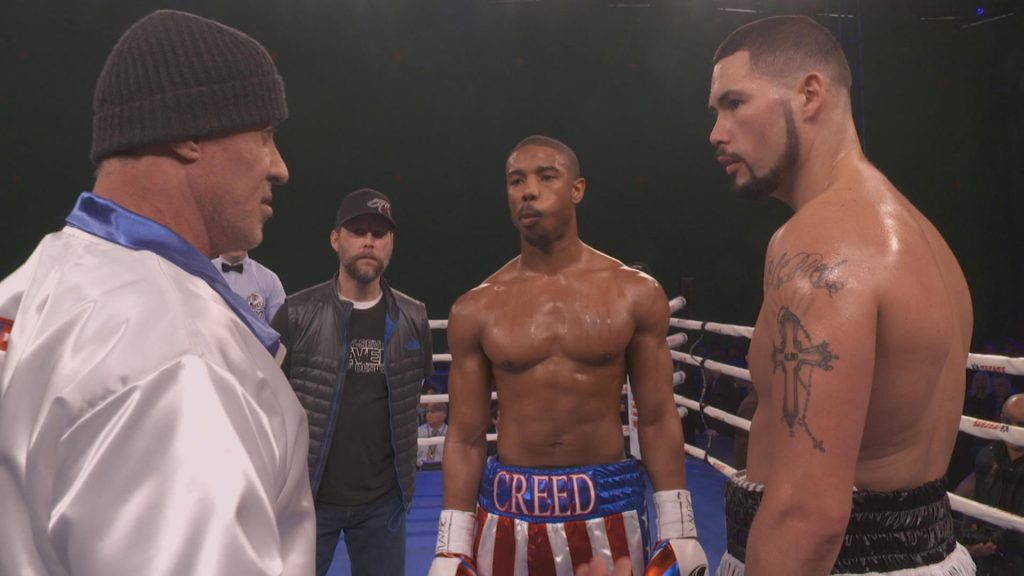
Max: Conlan’s definitely one of the better opponents the Rocky franchise has tossed out there, especially when you consider he’s a criminal much in the way Rocky was a legbreaker in the first film. He even has his own “bad” Mickey, who pressures him to fight Creed because Conlan’s not going to be able to provide for his kids in jail.
Man, let’s talk about the fights in this thing. The end fight is extremely good, definitely one of the best in the series.
David: I was super impressed by the one-take that was the entirety of the Creed/Leo fight, as well as that coming-out sequence with Conlan, which was also fantastic. While the movie’s first fight is one long, unbroken shot, its second is rapid-fire and kinetic, with tons of match cuts juxtaposing Conlan and Creed’s psychological and physical states deteriorating over the course of the fight. Basically every conflict that’s been set up in the movie so far gets resolved in that ring — Adonis vs. Rocky, Adonis vs. Conlan, Adonis vs. himself and Adonis vs. his father — as Coogler highlights the interplay between the ground game and the mind games. It doesn’t shy away from how brutal boxing is as a sport, either.
Max: Rocky V spent an entire movie to tackle the horrifying toll of boxing on the human body, and a SINGLE line from Mary Anne Creed about Apollo being so concussed he was unable to wipe his own ass does more to get that across. The danger that Donnie might die in the ring just like his father — and that Rocky has to push past his feelings of guilt over Apollo’s death in order to keep Donnie in the fight — is a great way of building on decades of story while still being instantly understandable to someone who’s never seen a Rocky film before.
David: It’s a melodramatic crowd-pleaser, but executed so efficiently and thoughtfully that it becomes something more than just a franchise relaunch. I’d only seen the original, and it was easy to get invested in the world and the characters; I imagine I’d have felt much the same way if this had been my first toe into the franchise. There’s a certain joy palpable in the result when you’re watching really talented people do something they love really well, and I feel that here — it’s commercial and personal and artistic all at the same time, with wonderful performances, a great soundtrack (Bianca didn’t have to be an actually good artist for the movie to work, but she was) and a ton of heart. Coogler’s an undeniable auteur with distinctly commercial and populist instincts, and I’m excited to see where his career takes him from here.
Max: Creed is a Rocky movie, and it’s more than a Rocky movie. It feels like a natural continuation of Rocky Balboa’s story and also a stand-alone drama with a distinct voice. As much as Hollywood’s drowning in pointless reboots, Creed is the rare franchise revisit that uplifts its source material in a way that’s really fresh and relevant.
